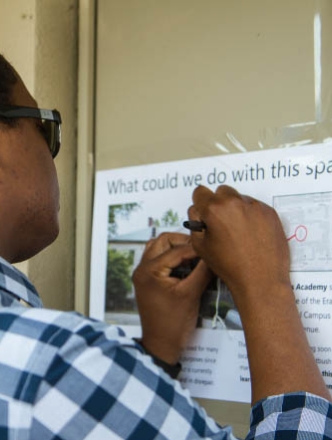
To best meet the needs of our students, we have decided to suspend enrollment in the Master of Arts in Art, Education, and Community Practice.
To best meet the needs of our students, we have decided to suspend enrollment in the Master of Arts in Art, Education, and Community Practice.
The 30-credit master’s program in Art, Education, and Community Practice will equip you with interdisciplinary training in radical educational theory, social activism, and socially engaged art practice. Through hands-on projects and collaborative community initiatives, you’ll leave the program adept at using the arts as a method and medium of social change and ready to work effectively as an artist, community organizer, activist, and educator.
The foundational courses of the Art, Education, and Community Practice MA cover the history and practice of socially-engaged art, critical pedagogy, and social activism, striking a balance between theoretical exploration and practical application. You will also choose elective courses from across the university that complement your personal interests and professional goals. Throughout your coursework, you will learn from artists who create socially-engaged work and collaborate with local organizations and community partners to understand how art can address historical, political, cultural, and social needs.
For your capstone project, you will draw on your knowledge of creative activism strategies to design, develop, and document your own art activist initiative.
This module addresses the expanding field of socially engaged art in the US and internationally: its history, current practices, and conceptual understandings of art, politics, public sphere, activism, and democracy. Students learn first-hand from socially engaged artists locally and globally.
Providing a firm grounding in popular education and social justice education that is inspired by Paulo Freire, students explore the educational function of socially engaged art: learning about critical pedagogy in public, community-based, informal, and virtual/media-based contexts, both locally and globally.
Overlaying the artistic and educational modules is a focus on social activism and community engagement that explores the history, politics, and ethics of working in local, global, and virtual contexts. Within this module students learn about methods, tactics, and strategies of engagement from social movements and community organizing to create artistic interventions in public and community spaces.